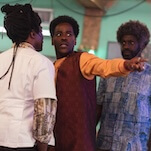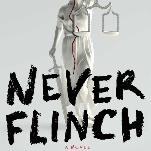There’s something wrong with Will Graham.
Not mentally wrong. That’s not news, Will wouldn’t be good at his job if there wasn’t something up with his mental state. But there’s a physical explanation for Will’s headaches, loss of time and hallucinations. He’s got a nasty case of encephalitis, and it leads Hannibal to hoodwink his bud Dr. Sutcliffe (John Benjamin Hickey) into breaking his Hippocratic oath in all kinds of ways in the name of research. Or, so poor Dr. Sutcliffe thinks.
That emphasis on Will’s sanity despite symptoms to the contrary is at the heart of “Buffet Froid.” He may have an empathetic disorder, but the headaches, hallucinations and time jumps are not a part of that disorder. “I know what kind of crazy I am,” Will says, “and this isn’t that kind of crazy.” This is what separates Will from this week’s episodic baddie, Georgia. Played by Ellen Muth, Georgia is one of the clearest callbacks to another one of Bryan Fuller's series, aside from the appearance of Gretchen Speck in “Amuse-Bouche.” This Georgia is the opposite of Dead Like Me’s George. Hannibal’s Georgia believes she is dead, diagnosed by Hannibal as having Cotard’s Syndrome, while Dead Like Me’s George spent a good deal of time bristling against her deceased status. She and Will share parallels but differ on important points; namely, Will has a physical, rather than psychosomatic, explanation for his problems. Georgia and Will both use faces as a means of stability. Georgia can’t recognize faces, becoming the source of her violence and distrust. To her, everyone is wearing a mask, which we finally get to see when she witnesses Hannibal murdering former friend Dr. Sutcliffe in order to protect Will-as-plaything. She has lost her sense of self. Will is the opposite. Not only does he use his name and his location to anchor himself in reality, but Hannibal instructs him to draw clock faces. Will believes they are accurate; it’s his physical condition that is causing the problems. Will knows he's alive. Yet, that hasn't occurred to Georgia in awhile.
Last week, commenter mxyzptlk pointed out that psychoanalysis is about a patient creating a narrative using the analyst as a means to explore that story. “Trou Normand” is about the power of controlling your own narrative. In “Buffet Froid,” we get a concrete example of how Hannibal is taking away Will’s power by hiding his encephalitis diagnosis. Hannibal wants Will to think of himself as insane, to make him feel even less stable. Hannibal’s control over Will’s narrative also highlights ideas of the mask of sanity that is played out literally in Georgia’s murder. This is the second episode in a row where a character has said that Hannibal is the pinnacle of mental health. In “Trou Normand,” it was Alana. This week, it’s Sutcliffe: “Dr. Lecter here is one of the sanest men I know,” he says. Hannibal helpfully chimes in, “I would agree.” Each character has an explicit trust in Hannibal because he projects sanity. Will’s saner than he thinks, yet projects instability. Maybe Georgia is right not to trust the surface narrative.
One of the reasons I like Hannibal’s decision to keep with procedural pace, even though it has more than enough serial plot to go around, is that the procedure is never really consistent. Any student of the procedural can generally pick out the killer as soon as they are introduced. The classics rely on formula. Hannibal’s episodic deaths, and those who commit those deaths, are never truly consistent. Many times, the aftermath of the murder is of more interest than the violence itself, which bucks the current trend of ultra-gory television. Georgia, like Eddie Izzard's Dr. Abel Gideon, is imbued with menace because we see her stalk Beth Labeaux before ultimately slitting open her face. I love this lack of consistency.
But these episodic cases have never been Hannibal’s strong suit in a narrative sense, and I’m beginning to be less forgiving of the superhuman powers these killers have. In "Trou Normand," many commenters (rightly) questioned how an elderly Lance Henriksen could possibly lift a totem pole full of dead bodies. In “Buffet Froid,” a mentally ill women with a severe disease (SHE’S POSSIBLY A LEPER) tracks Will from Delaware to Maryland in the freezing cold, in little more than a blood-stained dress. Also, girl’s got to be mighty strong to be able to pull Beth’s full weight, all monsters under the bed-style. Hannibal is such a terrifying character who has endured throughout literature, film, and, now television, which is because of his aforementioned sanity, the idea that hiding underneath this peak human is the craziest one of all. He could be your doctor. He may be flamboyant, but at least he isn’t supernatural.
Stray observations:
- Recipe of the week: Foie Toast with Jamón Ibérico
- I totally wanted Georgia’s mother to be Cynthia Stevenson.
- No Alana this week. Did anyone miss her? Not particularly. The writers have to start giving her a reason to exist at some point.
- There’s an interesting discussion of mental illness folded into “Buffet Froid.” “What I learned is how little is actually known about mental illness. All I know is it’s rarely about finding solutions. It’s just more about managing expectations,” Georgia’s mother says. Georgia's case became so bad, her mother's expectations became for her to wish for her own daughter's death.
- I liked Hannibal's rubber suit. Do you think Hannibal, Dexter and Walter White have a rubber suit guy? Can someone make that series?
- “What do you smell on me?” “Opportunity.”







































